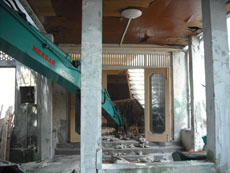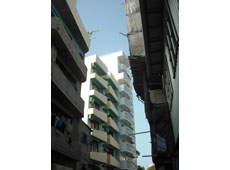The Human Rights Commission of the Maldives (HRCM) in conjunction with the UNDP have this morning presented their report on the rights of persons with disabilities in the Maldives.
The report, Activities Addressing Rights of Persons with Disabilities, is a “baseline assessment” of the rights and challenges concerning disabled people in the Maldives, as well as a number of recommendations from the HRCM on how to improve the lives of those with physical or mental impediments.
The report shows that in 1981, when the first ever screening was conducted in the Maldives, there were 1,390 people with disabilities, or 0.9 percent of the population.
In the 2000 census, the number rose to 4,728 which comprised 1.75 percent of the population. In 2002, the figure had risen further to 3.4 percent, or 9,216 people.
The most recent census (a preliminary report by Handicap International in 2009) showed 8.1 percent of the population has either temporary or permanent disabilities, including 4.7 percent with severe permanent functional limitations.
The HRCM report states that “lack of standard definitions of disability and different survey methodologies do affect the number of persons screened as having disabilities.”
The Maldives signed the UN Convention on the Rights of Persons with Disabilities (CRPD) in 2007, but the Parliamentary approval needed to ratify the convention was only reached in January 2010.
Although rights for persons with disabilities are part of the Constitution, the proposed bill on protecting rights of persons with disabilities was sent back to Parliament by the president for reconsideration in January 2010.
According to the HRCM, the bill was sent back “because it was found crucial to amend the bill in line with the United Nations Convention on the Rights of Persons with Disabilities (UNCRPD).”
Education
The HRCM reported that approximately only one out of every ten children with disabilities is enrolled in school. This means 230 children out of 2,250 with disabilities in the entire country are attending school.
Jamaluddin School, Ghiyaasuddin School and Imaduddin School are currently the only schools in Malé which offer a full curriculum for children with disabilities. This began in 1985 when Jamaluddin School opened up enrolment for children with hearing disabilities.
There are currently eleven schools nation-wide which provide for children with disabilities.
The Ministry of Education had planned to set up “minimum one school in each atoll that enrols children with special needs by 2010” but the HRCM report says in most schools, “classes are accommodated with multi-handicapped children with a limited number of teachers.”
Training teachers to work with children with special needs is another major issue, as is creating an action plan for children with disabilities and improving special education policies.
The HRCM reported that “there is virtually no access to or transition to secondary level education for children with special needs.”
Health services
The HRCM has pointed out that “human resources and facilities required to address mental health is lacking.”
According to the report, there is no mental healthcare available in Malé; there are only two psychiatrists working in the country who deal mostly with drug rehabilitation.
There is also a lack of quality residential care. There were more than thirty-one persons with disabilities waiting for a place at the Home for People with Special Needs in Guraidhoo as of March 2010. In contrast, there were thirty-one other patients who had been discharged but not taken home.
The HRCM said “their families aren’t taking them home. Some have been there for over six years.”
There are currently 137 beds in six wards around the country. A seventh ward was built in 2009, but cannot start functioning until furniture can be brought in.
The government is also providing “approved essential psychotropic drugs free of charge to registered psychiatric patients.” Patients can send in a form to the Ministry of Health and Family to get approval for free medications, including anti-depressants and anti-psychotic drugs.
The government also provides assistive devices, such as wheelchairs, crutches, spectacles, hearing aids and special seats with children with cerebral palsy.
Employment and financial assistance
The HRCM states “the most obvious gap in services provided to persons with disabilities is lack of employment services.”
They note that there is no support from the government in helping disabled people find jobs, and 72 percent of working age men and 93 percent of working age women with disabilities were not in work as of 2008.
The HRCM believes one of the biggest challenges with employment is that many employers have low expectations about what persons with disabilities can and cannot do, thus excluding them from the workforce due to discrimination.
The HRCM stated that “although assistive devices are available from the government, there is limited information made available to persons with disabilities.”
The government currently provides a monthly allowance of Rf 1,500 (US$118) for legally blind persons through the Ministry of Finance and Treasury, but “there is no income assistance to persons with other forms of disabilities.”
Access to buildings and transport
The HRCM has recognised limited access to premises and on transport as one of the major service gaps for people with disabilities.
They note that “inaccessibility of the built environment is a major contributing factor that decreases the number of workplaces available to persons with disabilities,” and suggests that homes, hospitals, schools, mosques, government offices, courts and shops be “more accessible and user friendly.”
Although they note there is “evidence of genuine attempt to address this issue” in the Family and Children Service Centres, the National Building Code must be amended in order to eliminate obstacles to indoor and outdoor facilities.
“The roads, pavements, road signs and traffic lights are not designed to be friendly for persons with disabilities…it’s lamentable that wheelchair access is not possible even on ferry services between Malé and the airport.”
The HRCM suggests that improving roads and transport to be more accessible will not only help those with disabilities, but will also benefit the elderly, parents with prams, and people carrying groceries.
The HRCM made numerous recommendations in their report, including how to improve leadership and commitment from the government and community; teaching sign language to staff at the Ministry of Health and Family and the Maldives Police Service, among others; and improving access to information for people with disabilities on how their lives can be bettered through government policies.
NGOs
There are several NGOs working to improve the rights of disabled people in the Maldives, such as Hand in Hand, Association of Disability and Development, and Handicap International among others, but the Care Society is currently the only one who provides services and has been working with people with disabilities for eleven years.
Shidhatha Shareef from the Care Society said “clearly, we have a long way to go. Many services are still not available [for persons with disabilities].”
She said the NGOs are also facing many challenges and limitations, especially regarding staff training and public awareness.
The Care Society runs a school for children from zero to twenty-five years of age with disabilities. They are currently catering to 55 children and are trying to promote education services on other islands.
Shidhatha said one of the bigger problems with education concerning children with disabilities is that most schools only take children with very limited to moderate disabilities, and not those with more severe disabilities.
She said the best way the government can help improve the lives of persons with disabilities is by “prioritising the issue,” and added “we do hope the bill [on protecting rights of persons with disabilities] is ratified soon.”
Shidhatha said despite all the work being done to ensure the rights of persons with disabilities, such as signing the CRPD, “people with disabilities do not have equal rights.”
Likes (1)Dislikes
(1)Dislikes (0)
(0) 
